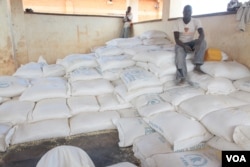Malawi lost much of its foreign donor support following the 2013 government corruption scandal known as Cashgate, but things could be looking up. The International Monetary Fund now says it will disperse a remaining $30 million in assistance to Malawi under the institution's Extended Credit Facility, or ECF, program.
A team from the International Monetary Fund wrapped up a two-week visit to Malawi with some good news. Recent banking reforms have helped “tame inflation,” and the IMF is projecting 3-4 percent growth in the coming year.
Major reforms to public management, however, are still needed, said IMF delegation leader Oral Williams.
“I particularly refer to having bank reconciliation so that we can give an account of execution of the budget, as well as reporting on the arrears if they do arise, so these are the two key areas that we would need to go forward," said Williams.
Malawi’s finance minister, Goodall Gondwe, says authorities have made monthly bank account reconciliation a requirement for government offices.
“I hope very much that it will be possible to continue working hard as we have done so that next time Mr. Williams comes, [he] will say the same thing - that ‘we are doing a little bit better," said Gondwe.
In September, the government held a verification campaign to remove ghost workers from its payroll. The results of that audit are not yet public.
Malawi has to reassure foreign donors if it wants them to resume aid that was cut at the end of 2013 when the Cashgate corruption scandal broke.
A British auditing firm hired by the government discovered $32 million in government funds had been paid fraudulently to contractors, in particular private construction companies, for goods and services that were never delivered.
About 70 business operators and government officials were arrested. Ten people have been convicted of theft and money laundering, including the supposed ringleader, former ruling party official Oswald Lutepo.
When foreign donors cut aid, Malawi lost an estimated $150 million annually. The country relies on foreign assistance for about 40 percent of the national budget.
Now Malawians want to know if other donors will follow the IMF's lead.
Not yet, said the European Union representative in Malawi, Marchel Germann. He told local radio last week that the EU will make its assessment at the end of 2016.
Germany's ambassador to Malawi, Peter Woeste, told VOA he is optimistic.
“Malawi is clearly showing now a clear commitment to the reform and to modernize its public finance system, and I think if we continue this way we are in a good way forward," said Woeste.
In the meantime, the government has been forced to economize, including eliminating services like free meals for patients in public hospitals and cutting funding for the education sector.





